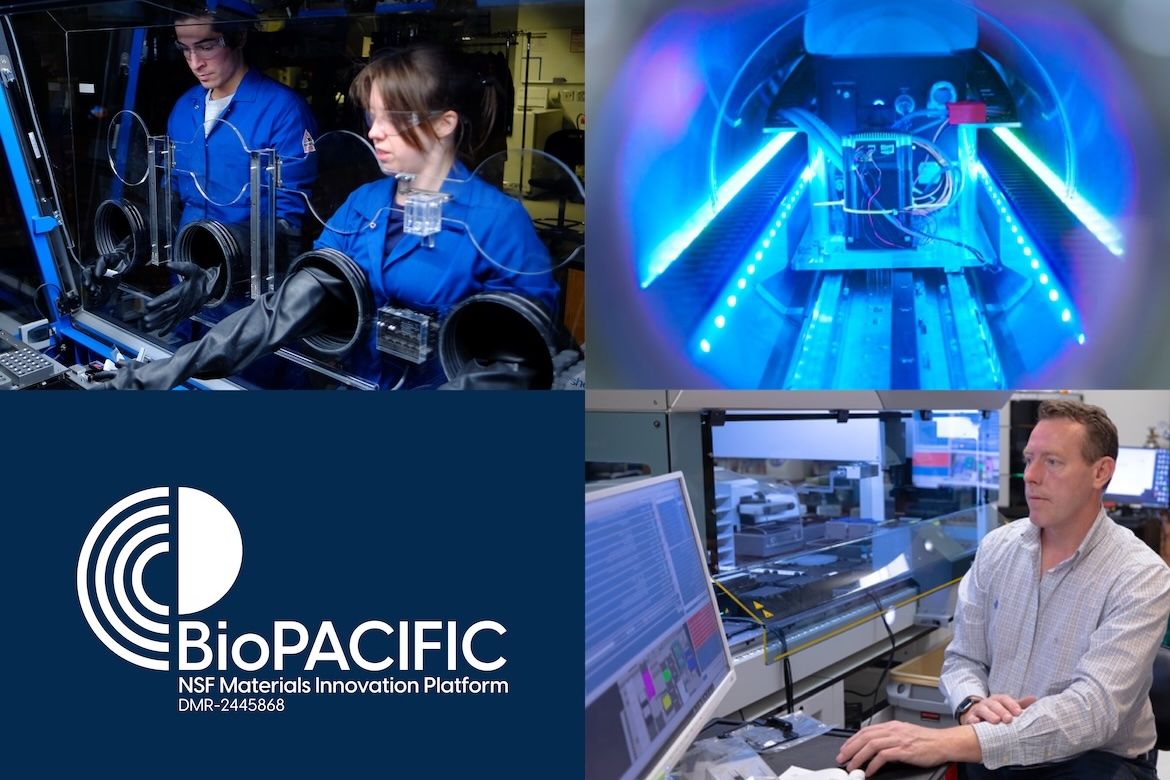
Marc Roseboro/CNSI at UCLA
BioPACIFIC MIP's interdisciplinary ecosystem brings together hands-on experimentation, advanced instrumentation and digital infrastructure.
The National Science Foundation has awarded BioPACIFIC MIP, a collaboration between the California NanoSystems Institutes at UCLA and UC Santa Barbara, a $19.8 million renewal grant to continue advancing the frontiers of environmentally friendly, biologically based materials as a sustainable alternative to traditional petroleum-based polymers.
This final five-year renewal grant will allow the initiative to accelerate its pioneering research — uniting synthetic biology, chemistry, automation and artificial intelligence to reshape how biomaterials are discovered, designed and deployed — while training a future workforce, boosting the economy, and strengthening California's and the nation's leadership in sustainable innovation.
Launched in 2021 with a $23.7 million NSF grant, BioPACIFIC MIP (short for Biomaterials, Polymers and Advanced Constructs from Integrated Chemistry Materials Innovation Platform) is one of four NSF-funded MIPs in the country. It serves as a national open-user facility, offering UC faculty and researchers across the U.S. access to state-of-the-art tools and in-house knowledge and mentorship. Since opening its doors, it has supported approximately 130 projects across 22 states, including many from smaller institutions that lack access to advanced infrastructure.
"Users from across the country can utilize one-of-a-kind equipment and take advantage of extraordinary expertise in an environment that greatly accelerates research in polymers and biomaterials," said Heather Maynard, co-director of BioPACIFIC MIP and UCLA's Dr. Myung Ki Hong Professor of Polymer Science. "This benefits our country by providing paradigm shifts in how new materials are discovered and characterized. I am thrilled that the NSF has enabled us to continue this work."
A major focus of the initiative over the next five years, Maynard said, will be integrating robotics and artificial intelligence to enable autonomous experimentation. This transformation, complemented by BioPACIFIC MIP's robust digital ecosystem, is designed to speed discoveries, eliminate bottlenecks and move promising new biomaterials more quickly from the lab to real-world applications.
And with in-house researchers connecting fundamental research to industry needs, real-world advances have already been rolling out, from the development of biodegradable plastics with partner BASF to on-demand degradable packaging adhesives and new engineering materials for microelectronics, paving the way for higher data density and next-generation computing. In addition, several startups have emerged from BioPACIFIC MIP's innovative research ecosystem, including Praio, FLO Materials and Saku Biosciences, which are helping commercialize materials, workflows and biotechnology developed through the hub.
The BioPACIFIC MIP also provides graduate students and postdoctoral fellows with cutting-edge workforce training in fields such as robotics, artificial intelligence and automated chemistry that align with industry needs. To date, more than 100 young scientists have benefited from the preparation afforded by this unique, collaborative research and development environment.
Read the full press release on UCLA's California NanoSystems Institute website.






